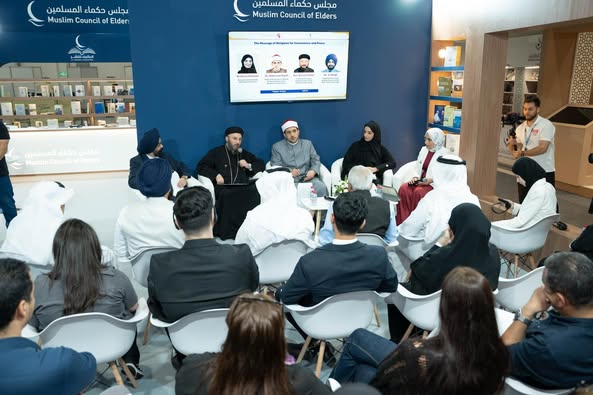Countering Islamophobia and Building Bridges of Dialogue and Understanding — A Seminar by the Muslim Council of Elders at the America International Arabic Book Fair (AIABF)
As part of its participation in the inaugural America International Arabic Book Fair (AIABF) in Dearborn, Michigan, the Muslim Council of Elders hosted a seminar titled “Countering Islamophobia: Building Bridges Through Dialogue and Understanding.” The panel featured Prof. Muqtedar Khan, Professor of Political Science at the University of Delaware and author of ‘Islam and Good Governance: A Political Philosophy on Ihsan;’ Prof. Mohammad Hassan Khalil, Professor of Religious Studies and Director of the Muslim Studies Program at Michigan State University; and Prof. Morgan Shipley, Foglio Endowed Chair of Spirituality and Associate Chair for Undergraduate Studies in the Department of Religious Studies at Michigan State University.
Prof. Muqtedar Khan opened the discussion with a thoughtful analysis of how dialogue and cultural exchange can help address Islamophobia. He cited research showing that people with personal relationships with Muslims are far less likely to hold Islamophobic views, thanks to positive, real-life interactions. “As Muslims, we also have to recognize our own stereotypes and work to improve them. If we want equality, respect, and dignity, we should extend it to others the best way we can,” he urged.
Prof. Mohammad Hassan Khalil, Professor of Religious Studies and Director of the Muslim Studies Program at Michigan State University, offered a comprehensive overview of Islamophobia and its societal impact, highlighting the importance of initiatives led by the Muslim Council of Elders in addressing it. “Much of Islamophobia stems from misinformation,” he said. “This is why workshops that explain core concepts and deconstruct misconceptions are so essential.”
Prof. Morgan Shipley, Foglio Endowed Chair of Spirituality and Associate Chair for Undergraduate Studies in the Department of Religious Studies at Michigan State University, focused on the influential role of media and cinema in shaping perceptions of Muslims. “Islamophobia may be irrational, but it is deeply embedded in dominant Western narratives,” he noted. “Muslims and Arabs are too often portrayed as antagonists, with only a handful—roughly 12 out of 900 mainstream films—offering accurate or non-negative representations.” He emphasized the urgent need to amplify positive portrayals and foster dialogue across religious and cultural lines to promote mutual understanding.
The Muslim Council of Elders has participated in the America International Arabic Book Fair (AIABF), held at the Ford Community & Performing Arts Center in Dearborn, Michigan, from May 1 to 4, 2025.










